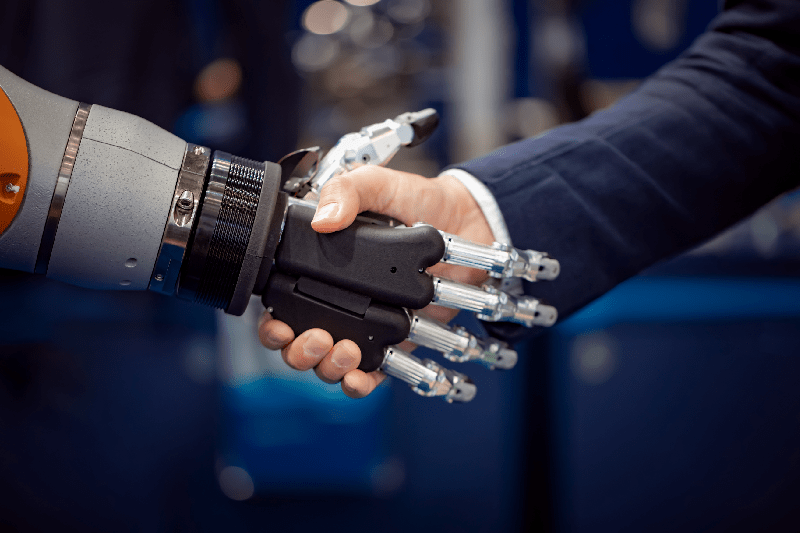Artificial Intelligence (AI) is the phrase on a lot of people’s lips at the moment so it’s no surprise that it has piqued your interest and led you to this blog post.
AI has been a popular topic of conversation for a number of years in the world of business and beyond, but with the recent launch of conversational chatbot, ChatGPT, discussions are more dynamic than ever.
Many people are excited at the prospect of a new AI tool and the potential Artificial Intelligence holds in general. Others, however, are concerned about what it means for the future of certain job roles and how it will impact the way businesses interact with their customers.
Here, we explore the pros and cons of Artificial Intelligence to explain some of the most valuable ways AI can help you run your business. We’ll also look at some of the potential downsides you might need to be aware of.
How are businesses using AI?
Before we investigate the pros and cons of AI, here are just some of the most prevalent ways businesses are currently implementing Artificial Intelligence:
Personalised ads
Platforms such as Google and Meta use AI to gather data on audiences and create algorithms based on their behaviors and online activity. This is then used to serve targeted brand ads to them, designed to align with what they search for or the content they interact with.
A similar use of AI is also leveraged by companies like Netflix, Spotify and YouTube to monitor the content you consume and offer tailored recommendations based on this.
Chatbots and virtual assistants
If you haven’t used a chatbot or virtual assistant for your own business yet, you’re sure to have encountered one as a customer. Siri, Alexa, and Google Assistant are common household examples, but more and more businesses are using them on their websites to automate customer service.
Fraud prevention
Banks and other financial institutions are generating and deploying AI algorithms to detect fraudulent activity and clamp down on financial crime and cyber security breaches.
Self-driving vehicles
Driverless vehicles are another hot topic of the moment and part of the AI realm. Companies like Tesla and Waymo are leading the way with self-driving vehicle technology but it’s also being used by companies, like delivery service Starship, who recently released (literally) intelligent food delivery robots that can navigate themselves.
As you can see, AI can certainly add serious value to your tech stack and dramatically revolutionise how you run your business—but what’s the catch and are there any kickers? Let’s explore the advantages and disadvantages of AI to find out.
The advantages of AI for businesses
Here are some of the most positive ways AI can assist in the running of a business:
Quicker, slicker systems
Manual data input and repetitive tasks are part of many, many job roles. AI can streamline this whole process by automating jobs and systems. For instance, good bookkeeping software these days tends to include bank feeds – a connection to your bank account so that your transactions will be entered as bookkeeping records automatically.
Not only will this make for a more well-oiled workflow, but it will also free up employees’ time so they can focus more on skills development and business growth.
Get to know your customers better
Predictive analysis, algorithms and intelligent data gathering reveal more and more about your customer, sometimes even in real-time. It can even be useful before you get started, as a tool to research a potential business idea or forecast future activity. Retailers, for example, can use AI to predict consumer trends and manage inventory and product development accordingly.
Plus, when you know your customers better, you can provide them with a far superior service and experience. AI tools like chatbots can interact with consumers to solve problems much quicker, taking a load off your workforce demands and keeping a smile on the customer’s face.
Automating parts of the customer service process also means you can optimise your time. You could even operate around the clock because humans don’t have to be physically present at all times with AI in play.
Reduced human error
Automation and machine-based intelligence have the potential to significantly reduce instances of human error. This is a boon in all areas but particularly advantageous in roles that depend on meticulous accuracy such as bookkeeping, accounting, and data records.
Make your employees’ lives easier
Goldman Sachs published a report which suggested AI could replace the equivalent of around 300 full-time roles. These kinds of statistics are breeding an epidemic of something referred to as ‘AI anxiety’, which is entirely understandable.
However, AI shouldn’t inherently be seen as a direct replacement for employees or their roles. For the most part, certainly for the time being, AI will simply be a supplementary tool people can use to make their jobs easier and more efficient.
The disadvantages of AI for businesses
Here are some potential cons to consider when thinking about how AI could help you run your business:
AI is clever but it’s not creative
AI is incredibly intelligent, as the name suggests, but it’s not emotional nor is it creative. In fact, even as it learns, an AI platform or tool will never get any more creative as this isn’t how it’s designed to be used.
For industries and businesses where creativity is paramount, AI won’t necessarily be the best option. Take copywriting and content marketing, for example. You can ask a tool like ChatGPT to create some informative words for you but the copy itself will lack your brand’s unique tone of voice and any creative storytelling.
AI can be expensive
Of course, AI tools come at a cost. Not all of them are super expensive and it can be worth it if it makes you more efficient, but as with all types of budget planning, it’s worth factoring into your decision making.
It’s a work-in-progress
Artificial Intelligence is still a relatively new concept in the grand scheme of things and AI tools are still very much a work-in-progress, constantly developing and redeveloping. This means there still needs to be a real-life human around to keep an eye on things.
Loss of the human touch
As well as the functional side of how a business works and interacts with its audiences, it’s also important to consider the emotional customer experience. A study by Forbes found that:
- 86% of consumers prefer speaking to humans over chatbots.
- 71% would be less likely to use a brand if human customer service reps weren’t available to speak to.
- Less than a third believe chatbots and virtual assistants make addressing customer service issues easier.
Think about how AI is going to affect your customers’ experiences and opinions of your business, not just how it will impact your own processes and operations. You don’t want to risk alienating customers – AI won’t work for every business.
Looking for more expert business support? Head over to our info hub for more news and helpful resources.









Leave a Reply